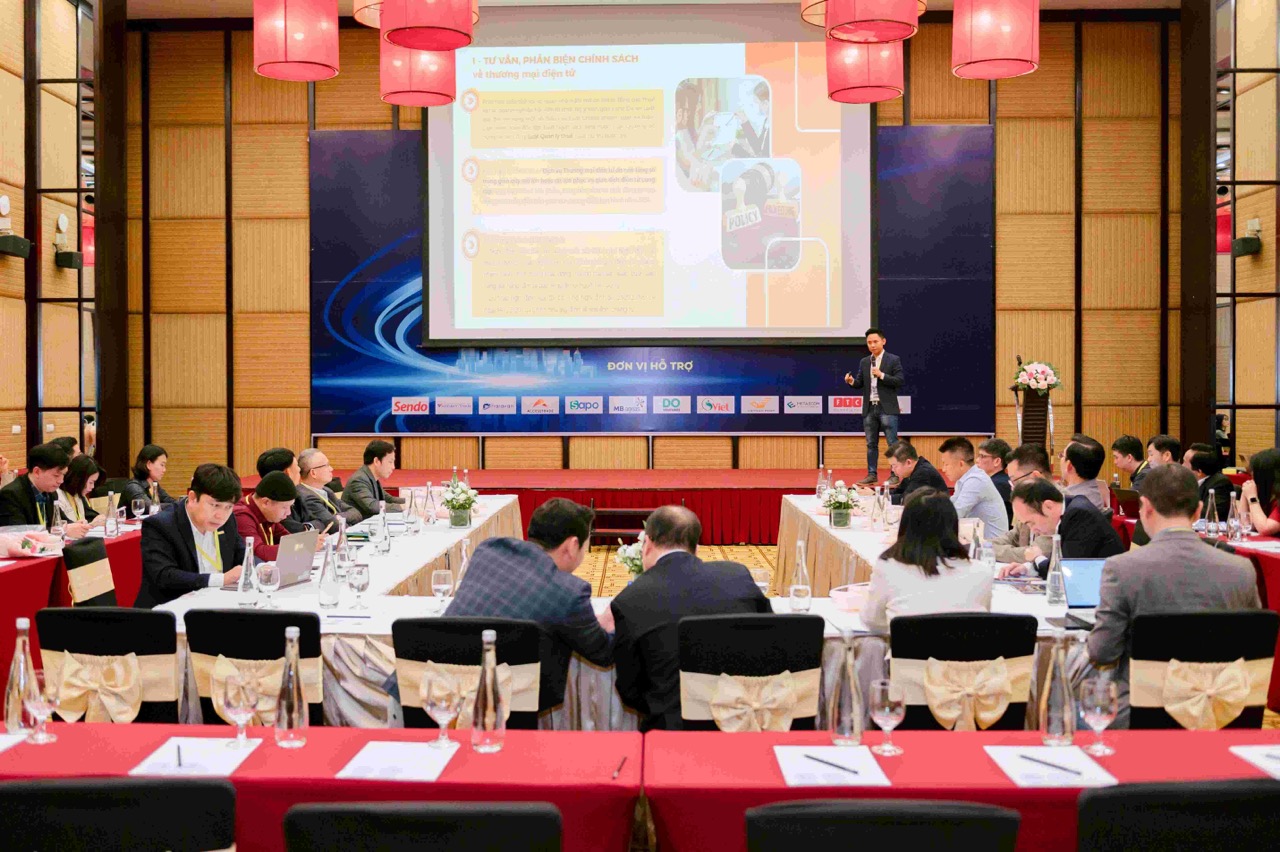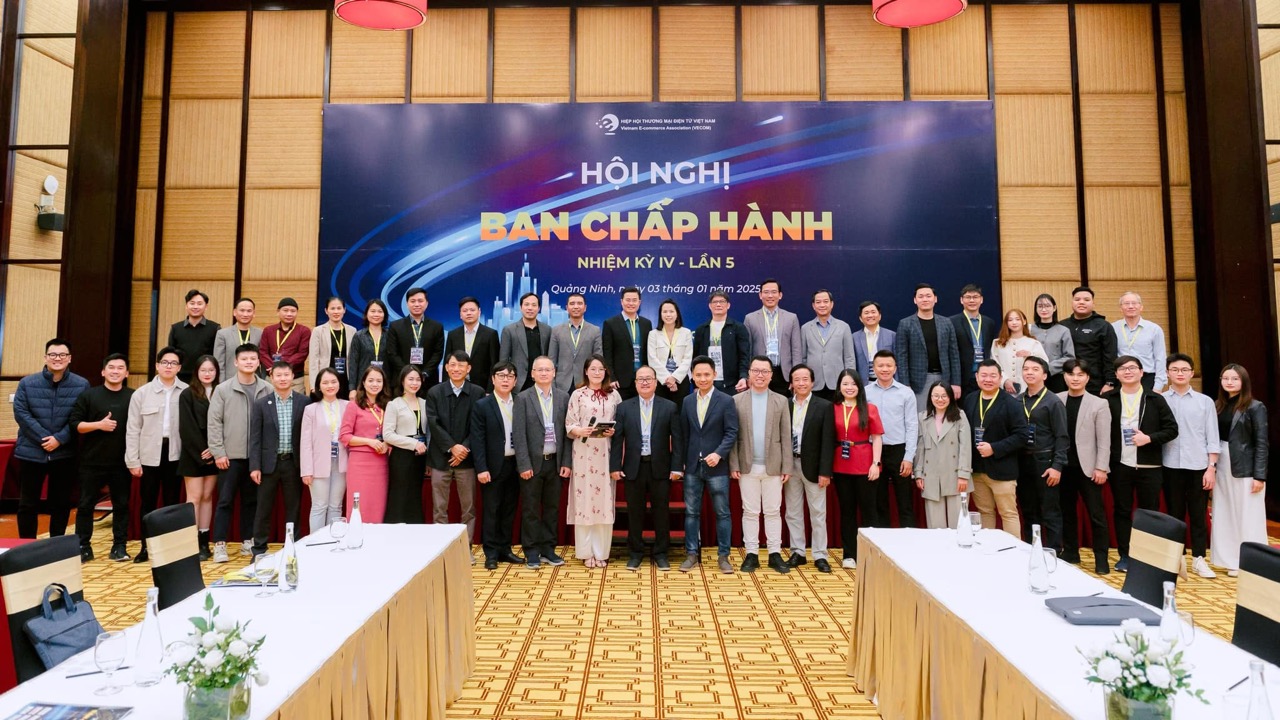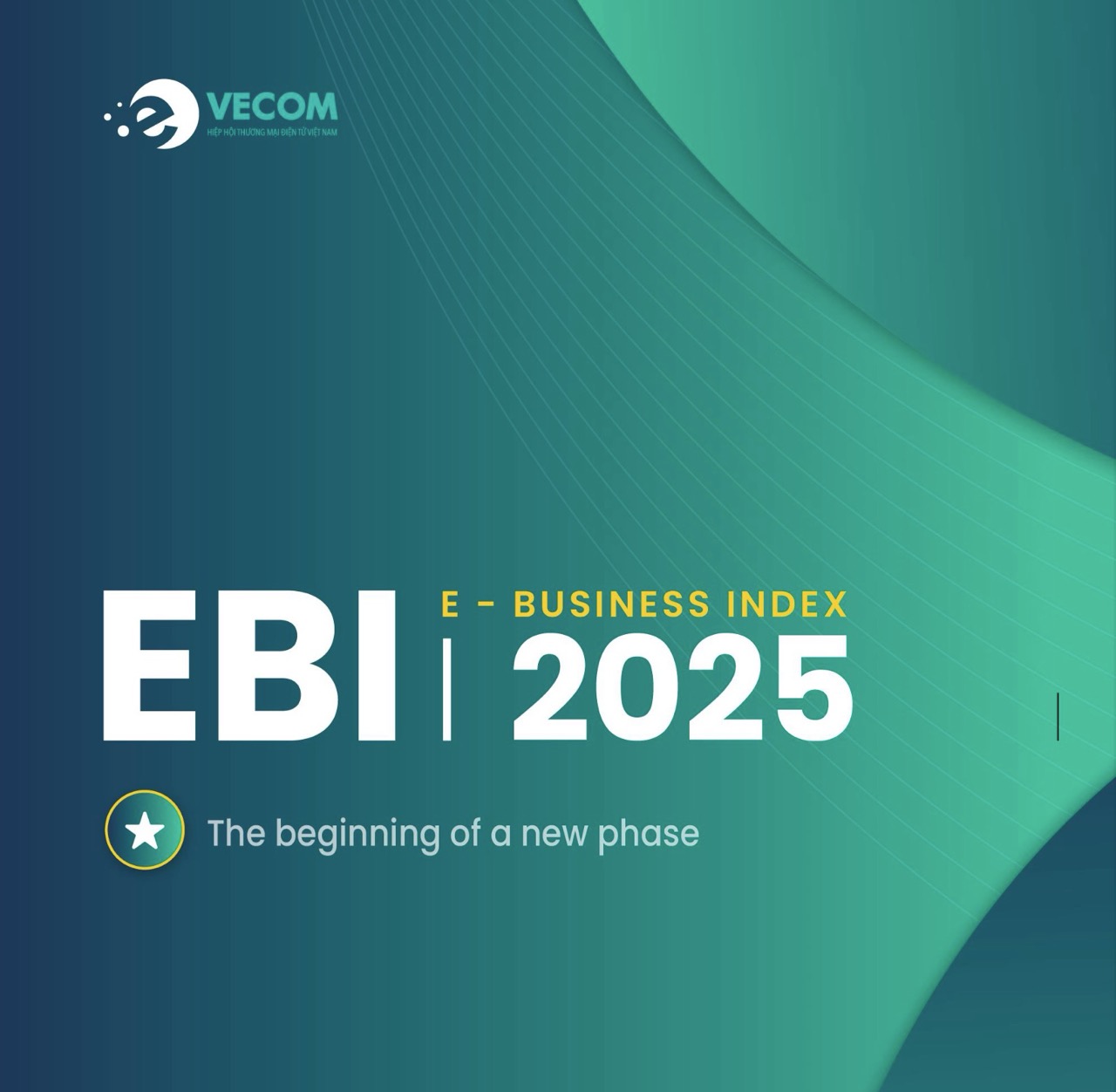The 5th VECOM Executive Committee Meeting of the 4th term took place on January 3, 2025 in Quang Ninh. This is an annual event, solemnly and meaningfully organized with the participation of the 4th term Executive Committee members, the Senior Advisory Council on E-commerce, the E-commerce Training Institutions Network, a number of close members and partners of VECOM. At the Conference, VECOM summarized and evaluated the results achieved in 2024 and approved the Work Plan for 2025.
This plan is built according to the Operational Direction approved at the 4th National Congress of the Vietnam E-commerce Association, the implementation status of activities in 2021 - 2024, the National E-commerce Development Master Plan for the period 2021 - 2025 and the practice of e-commerce development in 2024 as well as new trends in the period 2025 - 2026.

I. Consulting and reviewing policies and laws on e-commerce
Consulting and reviewing policies and laws on e-commerce is the core task of the Association to create a favorable macro environment for the strong and sustainable development of this field nationwide. Over the past years as well as in 2024, the Association has done a good job of this task. In the coming period, VECOM needs to continue to pay more attention because each change in state management policies will have a great impact on whether or not Vietnam's e-commerce can make a breakthrough.
In the coming period, VECOM's top priority is to continue consulting and reviewing policies, draft amendments and supplements to Circulars, Decrees, and Laws directly or indirectly related to e-commerce in order to continue to create an open environment, contributing to creating a strong growth momentum in 2025 as well as for the entire period of 2021 - 2025.
II. Main activities
1. Program “Sustainable e-commerce development”
Since 2019, VECOM has recognized the need for specific activities to help domestic e-commerce continue to maintain its growth rate in the context of changes in the global economy as well as in Vietnam. Therefore, VECOM has launched the Program “Sustainable e-commerce development for the period 2019 - 2025”. This program focuses on three main contents:
- Narrowing the gap in e-commerce development between localities.
- Developing high-quality human resources, focusing on improving the quality of e-commerce training at higher education institutions.
- Developing e-commerce associated with environmental protection.
1.1. Narrowing the digital gap.
- Over the past years, the proportion of e-commerce in Hanoi and Ho Chi Minh City has increased. Ho Chi Minh City still accounts for about 70%, the remaining 61 provinces and cities only account for about 30%. Although there have been many activities to promote e-commerce in the remaining 61 provinces and cities, this proportion has not changed much. The goal of the Program is that by 2025, the proportion of these 61 provinces and cities will reach 50%, while maintaining the average annual growth rate of the two economic centers of Hanoi and Ho Chi Minh City at a high level, but up to now, this goal is difficult to achieve.
- On the other hand, the National E-commerce Development Master Plan for the period 2021 - 2025 also sets a target that by 2025, the proportion of e-commerce in Hanoi and Ho Chi Minh City will account for 50%, and that of other localities will be 50%. The draft National E-commerce Development Master Plan for the period 2026 - 2030 continues to set out the task of developing e-commerce through regional linkages and narrowing the gap between localities. - In the period 2019 - 2024, VECOM has coordinated with many members and related units to implement many Programs and organize activities to promote e-commerce in many provinces and cities across the country.
1.2. Developing high-quality human resources
- In the period of 2022 - 2025, the Association prioritizes supporting universities, especially those training in the field or major of e-commerce. Through this activity, a team of well-trained e-commerce human resources will be created, capable of absorbing, mastering, developing, and transferring new trends and advanced technologies in the field of digital business. Making e-commerce truly a key driving force, serving the cause of developing the country's digital economy.
- Continuing the activities implemented in the training sector from previous years, in 2025, the Association needs to continue to maintain and implement annual programs well, while expanding new activities to bring more practical effects in promoting the quality of e-commerce human resources.
- Currently, VECOM has established two affiliated units operating in the training sector, including: E-commerce Training Institutions Network (VECOMNET) and E-commerce & Digital Technology Student Clubs Alliance (ECN). It is necessary to continue to develop effective operational plans for these two units in 2025.
1.3. Developing e-commerce in association with environmental protection
- The current development of e-commerce has clearly revealed negative impacts on nature and the environment. These impacts may include excessive use of environmentally unfriendly packaging, large carbon emissions during the transportation of goods when the process has not been optimized, or the trading of wild animals and plants in the digital environment.
- In 2024, VECOM coordinated with the World Wildlife Fund (WWF) to assess the impacts of e-commerce on the environment, and at the same time developed a set of criteria to guide the assessment and identification of green e-commerce businesses, sustainable e-commerce models, and no non-degradable plastic packaging. In 2025, it is necessary to continue promoting the dissemination of this set of criteria to the community. - VECOM also closely coordinated with WWF and Traffic to organize many activities to call on businesses to conduct healthy business associated with social and community responsibility, and establish a group of pioneering businesses to protect wild animals and plants in the online environment.
2. Cross-border E-commerce
- Online export has been implemented by a number of Vietnamese enterprises and traders since before 2010, mainly in the form of B2B. Since 2015, online export activities have become increasingly strong in both B2B and B2C forms. Since 2022, online export has become quite popular and developed strongly with a higher growth rate than traditional export.
- In 2017, the Vietnam E-commerce Association (VECOM) established the Online Export Support Alliance (VESA). The Association and the VESA Alliance have worked with agencies, organizations and enterprises to implement many activities to promote digital transformation and the application of digital technology in export. In 2024, the Alliance also expanded to many members who are active in the field of online export to create a diverse ecosystem to support Vietnamese enterprises when they need to learn about and participate in the market.
3. Education Technology (EdTech)
- The Vietnamese Edtech sector began to develop when the community's demand for online learning increased rapidly. During this period, the growth rate of online education companies could reach more than 150%. Although it is no longer growing as strongly as during the COVID-19 pandemic, the Edtech market still has a lot of room for development. In particular, the Vietnamese market is also ranked 3rd in Southeast Asia and in the top 10 of the world's most attractive markets for investors in Edtech.
- EdTech is both an effective tool for developing e-commerce human resources and an increasingly large market for online businesses. State management agencies and professional social organizations have not yet demonstrated their leading and supporting roles for businesses operating in this field. Therefore, in 2025 and the following years, VECOM needs to pay more attention to the EdTech sector and implement specific activities such as inviting businesses in this sector to join the Association, consulting and reviewing related policies and laws, organizing events such as seminars, forums, etc. to connect and share information between relevant parties.
4. Online dispute resolution
- VECOM predicts that in the coming period, e-commerce in our country will continue to grow at an average annual rate of over 20%.
- Along with the increase in the scale of online shopping, unfair business activities in general and disputes in the online environment will also continue to increase in the coming time. However, it can be seen that the current administrative violation handling system, courts and arbitration are not effective in resolving the very large number of disputes in e-commerce with the average transaction value of each case not being too large.
- In 2025, VECOM needs to coordinate with relevant organizations such as the Ministry of Justice, VCCI, law firms and major e-commerce platforms to research, propose and implement a mechanism and tools for dispute resolution that is compact, reliable and effective.
5. Protection of personal information
- Protection of personal information is important to the development of online transactions in general, including e-commerce. Protection of personal information has been stipulated in the Vietnamese legal system on electronic transactions and information technology.
- In the field of e-commerce, Decree No. 52/2013/ND-CP on e-commerce issued in 2013 and Decree 85/2021/ND-CP amending and supplementing Decree 52/2013/ND-CP on e-commerce issued in 2021 have many specific provisions detailing the protection of personal information.
- Building trust in online shopping, including personal information protection, is important for the sustainable development of e-commerce and is a long-term activity. The Association will coordinate with agencies, organizations, and member businesses to implement specific activities to raise awareness of personal information protection among the business community and consumers, while also ensuring to avoid overlap between regulations and Decrees or legal documents.






























